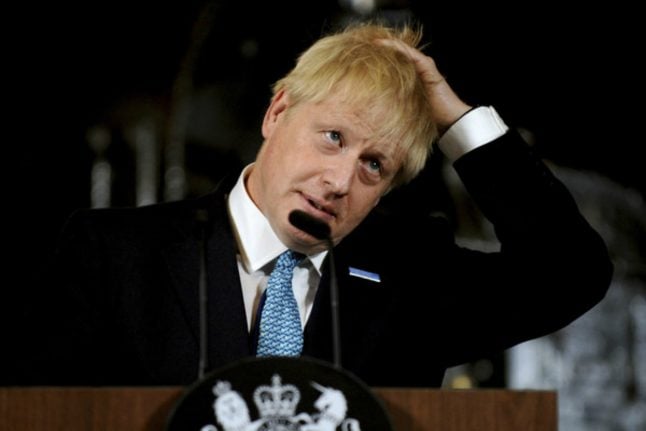Johnson, dubbed “Brexit-Boris”, by Germany's top selling daily Bild, replaced Theresa May as the UK PM last week following the Conservative leadership race.
“I am sure you will want to know what this means for you and your families in Germany,” said deputy UK Ambassador to Germany Robbie Bulloch in a statement posted on Facebook.
“Brexit was a central theme of Mr Johnson’s first speech as Prime Minister. He was clear that the UK will leave the European Union on 31 October and set out that he wants a new and better deal with the EU.
“However, he was also clear that leaving without a deal remains an option, if the UK is unable to secure an improved agreement. We therefore need to prepare for the possibility of a no-deal Brexit.”
READ ALSO: 'Cocky troublemaker': What the German media makes of 'Brexit Boris'
Bulloch stressed the German government’s stance that no British citizen will need to leave Germany as as result of Brexit.
If no withdrawal agreement is in place by October 31st, Germany plans an initial transition period of three months, which will likely be extended by a further six months. This will give Brits more time to apply to their local Ausländerbehörde (foreigners/immigration office) for a residence permit to ensure they can stay in the future.
The Embassy is planning a Facebook Q&A at 1pm on Tuesday, August 6th where anyone affected can put Brexit-related questions to their team.
As The Local has reported, Brits across Germany are already trying to secure their futures by applying for residence permits.
READ ALSO: Brexit limbo: How Brits in Germany are trying to secure their futures
However, because Germany is a federal country, power is devolved to individual immigration authorities and each area carries out the process in a different way, making it difficult for Brits to know how to act.
We also exclusively revealed that 8,000 Brits in Berlin still hadn't applied for a residency permit ahead of Brexit, even though the registering process opened up in the capital in January.
For details on what kind of residence permits are being given out to British people in Germany, check out our story here.
How to prepare for a no-deal
Bulloch added that the German government is putting in place all “the necessary legal framework conditions to ensure that every UK national in Germany receives a residence permit”.
Germany has also formed laws to protect pension contributions and facilitate access to healthcare and benefits for British nationals, “although conditions will apply,” added Bulloch.
In the message from the Embassy, Bulloch highlighted some practical advice for Britons.
– He said British nationals should make sure they are registered in Germany (through the Anmeldung process that everyone living in Germany must complete).
– They should apply for a residence permit from their local Ausländerbehörde or at least find out the process by contacting the immigration office where they live.
– Finally he recommended that Brits change their driving licence for a German licence and get any professional qualifications recognized before the UK leaves the EU.
READ ALSO: How Brits in Germany should make the most of the Brexit delay
Boris Johnson invited to Germany
It came after new PM Johnson held talks over the phone on Friday with German Chancellor Angela Merkel regarding Brexit and bilateral relations.
Chancellor #Merkel spoke to the new UK Prime Minister Boris #Johnson on the telephone today; they discussed #Brexit as well as bilateral relations. The Chancellor invited the Prime Minister to come to Berlin for his first visit in the near future. @10DowningStreet pic.twitter.com/TdW1NUDKSb
— Ulrike Demmer (@UlrikeDemmer) July 26, 2019
Merkel invited Johnson to visit Berlin soon and wished him luck in his new job, the spokeswoman for the Chancellor said.



 Please whitelist us to continue reading.
Please whitelist us to continue reading.
Member comments